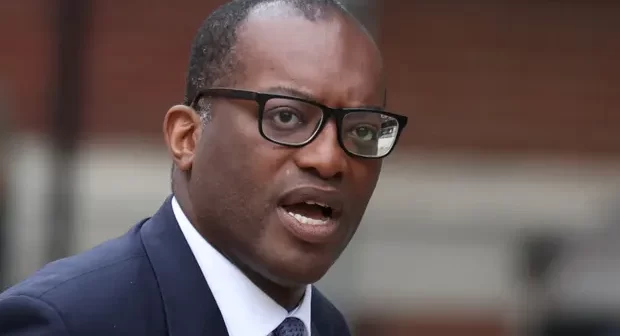Kwasi Kwarteng rolled the dice on the country’s future today by unveiling an extraordinary swathe of tax cuts in a bid to end the UK’s ‘cycle of stagnation’.
In a dramatic ‘Emergency Budget’, the Chancellor abolished the top rate of tax for high-earners, and brought forward a 1p cut in the basic rate of income tax to next April.
Mr Kwarteng reversed the national insurance hike, as well as scrapping a huge planned increase in corporation tax from 19p to 25p and limits on City bonuses.
Stamp duty is being ditched for values up to £250,000, with first time buyers exempt up to £425,000 – taking 200,000 people out of the system altogether.
Beer, wine and cider duty rises are being cancelled – and in an effort to bolster tourism overseas visitors will be able to shop VAT-free.
Dozens of low-tax and low-regulation ‘Investment Zones’ are being created across the country, with new startups enjoying breaks such as exemption from business rates.
Mr Kwarteng stressed there was a long-term challenge in Britain that needed to be tackled.
‘Growth is not as high as it should be,’ he said. ‘We are determined to break that cycle. We need a new approach for a new era.’
The barrage is not technically a Budget, but a ‘fiscal event’ – meaning that controversially it will not be accompanied by any of the usual independent costings from the OBR.
Mr Kwarteng kicked off by hailing the freeze on energy bills at a typical £2,500 for households, saying the government was determined to help with the cost-of-living crisis – even though he admitted the price tag will be £60billion just for the first six months.
And economists have voiced alarm at the massive borrowing that will be required to cover the hole in the government’s books.
The two year freeze on energy bills for households and businesses announced earlier this month could cost more than £150billion by itself, while the tax cuts could add a further £50billion to the tab.
The respected IFS think-tank suggested it would be the biggest tax move since Nigel Lawson’s 1988 Budget, when Ms Truss’s heroine Margaret Thatcher was PM.
The dangers of ramping up the UK’s £2.4trillion debt mountain as the Ukraine crisis sends inflation soaring have been underlined by the continuing slide in the Pound against the US dollar, reaching a fresh 37-year low of barely 1.11 this morning.
Markets have pushed up the government’s borrowing rates to an 11-year high.
In August and September so far the 10-year yield on government gilts has seen the biggest increase since October and November 1979, emphasising the nervousness of markets about the situation.
However, Ms Truss and Mr Kwarteng argue that ramping up economic activity can make up the difference, pointing to decades of lacklustre productivity improvements.
The Bank of England pushed up interest rates by 0.5 percentage points to 2.5 per cent yesterday, the highest level since 2008. But it surprised many by stopping short of a bigger increase, suggesting that UK plc is already in recession.
Source Daily Mail

